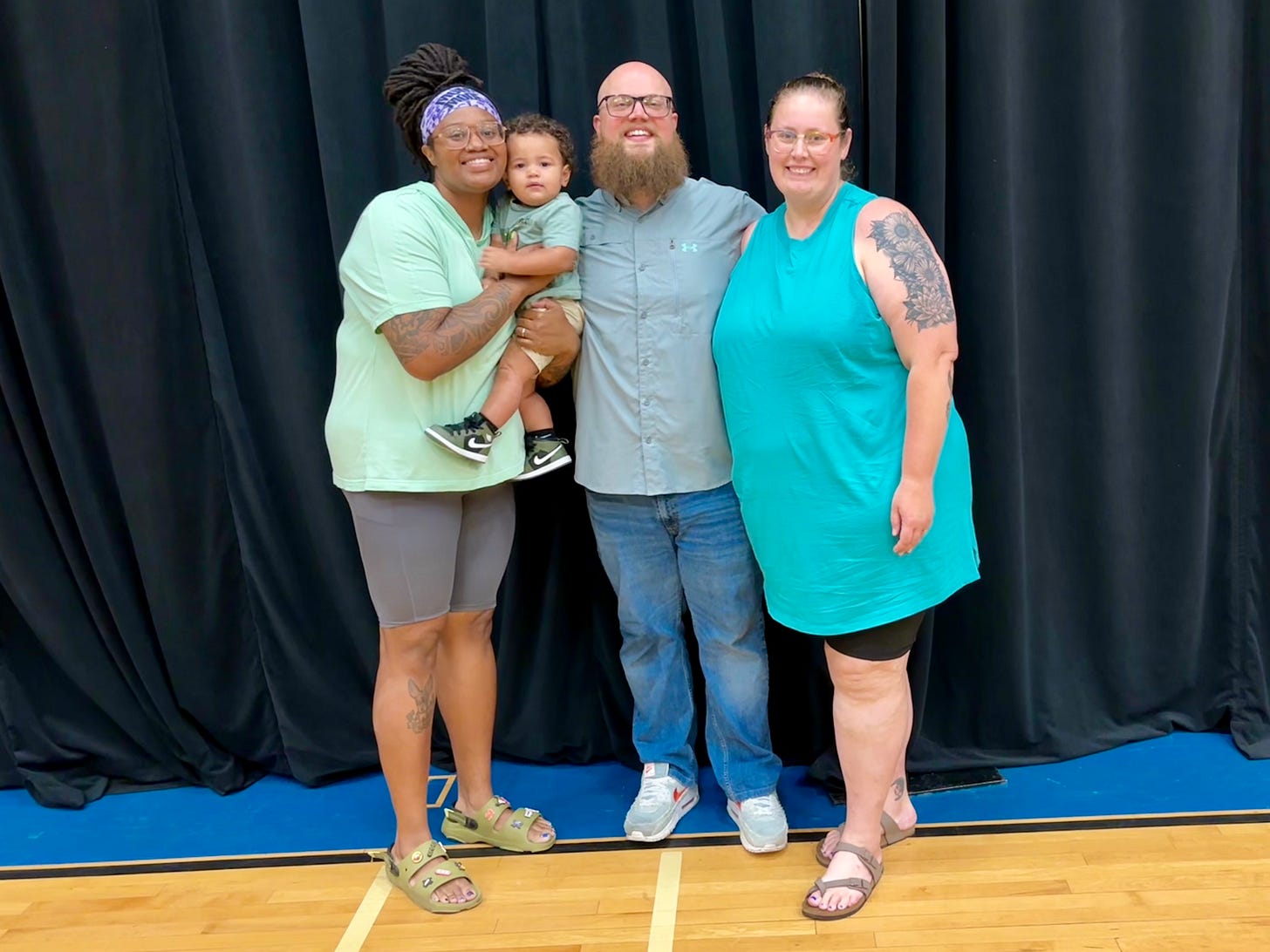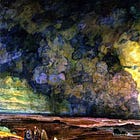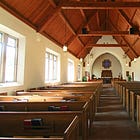Public Theology is based on the work of Zach W. Lambert, Pastor of Restore, an inclusive church in Austin, Texas. He and his wife, Amy Lambert, contribute to and moderate this account. Zach’s first book, Better Ways to Read the Bible, will release on August 12, 2025, and is available to preorder today.
Better Ways to Read the Bible is currently on sale through Baker, or you can receive a signed copy when ordering through Book People. (For signed copies: include the name of the person to whom you would like the book signed in the comments field during checkout at bookpeople.com; not yet available to those in the EU, so sorry!).
Every preorder qualifies for an instant download art print as well as a free copy of the audiobook upon release. Please complete this form to receive your preorder bonuses!
All of the content available at Public Theology is for those who identify as Christian, as well as those who might be interested in learning about a more inclusive, kind, thoughtful Christianity. We’re glad you’re here.
Happy Pride month, y’all!
If you aren’t familiar with Pride, it is simply a declaration and celebration of the dignity, equality, and brilliance of LGBTQ+ folks.
In the church world, celebrating Pride can be controversial, but I really don’t think it should be. Declaring the equality of all people and celebrating the unique ways we all embody God’s image shouldn’t be controversial at all. Father James Martin, an affirming Catholic priest, explains it so well.
[PRIDE is] a celebration of the human dignity for a group of people who have been, for so long, treated like dirt. For the religious person, it is a celebration of them as children of God. It’s especially important for churches to celebrate pride because a great deal of the rejection and even violence that the LGBTQ+ community has faced has been motivated by religion, or at least what people think religion teaches.
Just because you celebrate PRIDE, doesn’t mean you have to agree with every video, every article, or even what every float in a parade has to say. It’s about supporting the fundamental human rights of this community: the right to live in safety, the right to be treated as equals, and the right to be fully welcomed into society.
Father James Martin
For me, Pride isn’t only about broad support of the LGBTQ+ community; it’s also about my friends—many of whom are a part of our church family at Restore. It’s about people I deeply love who have been severely harmed at the hands of Christians and churches.
My friends have stories that some of you wouldn’t believe. Stories of being condemned to hell, being called “abominations,” being disowned by their families, attempting suicide, and even being tortured and abused through conversion therapy attempts. But they also have stories of finding safe, inclusive, Jesus-centered community—spaces where they are fully known, fully embraced, and can fully participate without restriction.
I can tell you firsthand just how much more Christlike love, joy, peace, patience, kindness, goodness, faithfulness, gentleness and self-control our community embodies because of the LGBTQ+ folks who participate, pastor, and preach at our church. I am so grateful to live and lead alongside of them.
Restore’s community is about 33% LGBTQ+ and queer people are engaged in every part of our church. Yesterday we had a special service centered around baptisms, kid dedications, and graduation celebrations, and LGBTQ+ people were a part of all three. One married couple, Halle and Danielle, both got baptized and also dedicated their incredible little boy.
Pride means different things to different people. A gay friend once told me, “Ask one queer person what they think about Pride and you’ll know what one queer person thinks about Pride.” We have LGBTQ+ folks at Restore fully committed to queer activism in the name of Jesus, but we also have LGBTQ+ folks who simply want to be treated like any other church member.
They want to hold hands with their partner in the lobby.
They want to get married with their pastor officiating.
They want to serve and lead without restriction.
They want to give and receive communion.
They want to dedicate their kids.
They want to get baptized.
I know many anti-LGBTQ+ Christians will try to convince you that fully affirming queer folks in the church will make Sunday gatherings look like the most scandalous float at a Pride parade, but that’s just not true. At Restore, being LGBTQ+ affirming (during Pride month and every other month) looks like:
Halle and Danielle getting baptized and then dedicating their son together.
It looks like a same-sex couple celebrating their anniversary right alongside a straight couple.
It looks like a transgender person handing out communion and saying, “The body of Christ, broken for you. The blood of Christ, shed for you.”
It looks like an LGBTQ+ small group being advertised right alongside our men’s group, women’s group, crocheting group, volunteering group, and every other small group available when we have a Connection Sunday.
It looks like a community centered on the radically inclusive love of Jesus.
I recently received a text from an LGBTQ+ member of our church that said:
My mind seriously couldn’t comprehend a world where I could be gay and part of a religious community. I had shut myself off from even entertaining it as a possibility, but God’s love always finds a way though and I was able to find my way back to him through your demonstration of his love. I’ve found he never left and was simply patiently waiting for me the whole time. The love I received at Restore is why I’m able to share love with others.
LGBTQ+ exclusion and marginalization has caused immeasurable harm to queer folks and it has also really messed up the church at large. When we exclude the people God told us to include, we miss out on the gifts and talents they bring. We miss out on the unique ways in which they bear God’s image and express the fruit of the Spirit.
Most churches have never gotten to experience the gifts that come from knowing, loving, and being led by LGBTQ+ people. I’m so glad our church isn’t one of them.
For the rest of the month, we plan on highlighting some of our favorite queer Public Theologians here on Substack. We’ll also be discussing affirming theology and sharing parts of our story which have been significantly impacted by our LGBTQ+ loved ones. Get ready! Until then, here are a few articles from previous months that intersect with Pride month:
If this post resonated with you, please share or restack it. We truly appreciate every read, comment, share, and restack.
Lastly, we are happy to cover subscription costs for anyone who needs it but can’t afford it at this time. If you would like to join the Public Theology community and gain access to our paid subscriber content (which we keep behind a paywall for the privacy and connection of our community) but cannot afford to do so, please message Amy Lambert directly.










The world, not just The United States, is so against anything and anyone who doesn’t fit into a mold of ‘how people SHOULD be’ that it is literally insane.
I will never understand why humans are so completely obsessed with power via the brutal oppression of marginalized communities that others are forced to live in fear because of personal autonomy and self identification.
It is cruel. It is frankly stupid, and I am tired of it. Human power is toxic. It is not Christlike and it is truly the devil’s playground.
I am SO grateful for places and people who are inclusive rather than evil and divisive. We could universally ALL use some peace and acceptance.
Thank you for exemplifying these positive qualities.
You made the very true point that rejecting others is harmful to the church and each of us individually. The body of Christ is more than just a metaphor. To me, it seems like the truth that we are all connected in ways we don't understand. We can not be whole without each other.